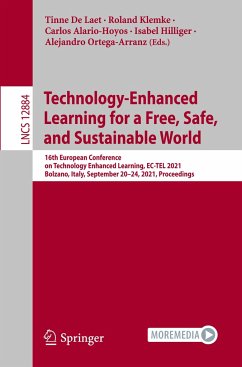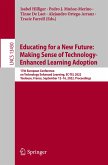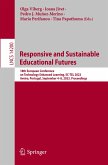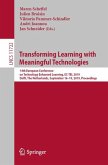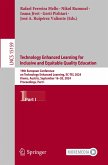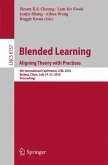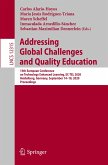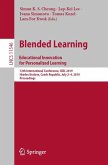Technology-Enhanced Learning for a Free, Safe, and Sustainable World
16th European Conference on Technology Enhanced Learning, EC-TEL 2021, Bolzano, Italy, September 20-24, 2021, Proceedings
Herausgegeben:De Laet, Tinne; Klemke, Roland; Alario-Hoyos, Carlos; Hilliger, Isabel; Ortega-Arranz, Alejandro
Technology-Enhanced Learning for a Free, Safe, and Sustainable World
16th European Conference on Technology Enhanced Learning, EC-TEL 2021, Bolzano, Italy, September 20-24, 2021, Proceedings
Herausgegeben:De Laet, Tinne; Klemke, Roland; Alario-Hoyos, Carlos; Hilliger, Isabel; Ortega-Arranz, Alejandro
- Broschiertes Buch
- Merkliste
- Auf die Merkliste
- Bewerten Bewerten
- Teilen
- Produkt teilen
- Produkterinnerung
- Produkterinnerung
Chapters "Investigating the Role of Educational Robotics in Formal Mathematics Education: The Case of Geometry for 15-Year-Old Students" and "From Paper to Online: Digitizing Card Based Co-creation of Games for Privacy Education" are available open access under a Creative Commons Attribution 4.0 International License via springer.com.
Andere Kunden interessierten sich auch für
![Educating for a New Future: Making Sense of Technology-Enhanced Learning Adoption Educating for a New Future: Making Sense of Technology-Enhanced Learning Adoption]() Educating for a New Future: Making Sense of Technology-Enhanced Learning Adoption64,99 €
Educating for a New Future: Making Sense of Technology-Enhanced Learning Adoption64,99 €![Responsive and Sustainable Educational Futures Responsive and Sustainable Educational Futures]() Responsive and Sustainable Educational Futures67,99 €
Responsive and Sustainable Educational Futures67,99 €![Transforming Learning with Meaningful Technologies Transforming Learning with Meaningful Technologies]() Transforming Learning with Meaningful Technologies74,99 €
Transforming Learning with Meaningful Technologies74,99 €![Technology Enhanced Learning for Inclusive and Equitable Quality Education Technology Enhanced Learning for Inclusive and Equitable Quality Education]() Technology Enhanced Learning for Inclusive and Equitable Quality Education60,99 €
Technology Enhanced Learning for Inclusive and Equitable Quality Education60,99 €![Blended Learning: Aligning Theory with Practices Blended Learning: Aligning Theory with Practices]() Blended Learning: Aligning Theory with Practices38,99 €
Blended Learning: Aligning Theory with Practices38,99 €![Addressing Global Challenges and Quality Education Addressing Global Challenges and Quality Education]() Addressing Global Challenges and Quality Education60,99 €
Addressing Global Challenges and Quality Education60,99 €![Blended Learning: Educational Innovation for Personalized Learning Blended Learning: Educational Innovation for Personalized Learning]() Blended Learning: Educational Innovation for Personalized Learning50,99 €
Blended Learning: Educational Innovation for Personalized Learning50,99 €-
-
-
Chapters "Investigating the Role of Educational Robotics in Formal Mathematics Education: The Case of Geometry for 15-Year-Old Students" and "From Paper to Online: Digitizing Card Based Co-creation of Games for Privacy Education" are available open access under a Creative Commons Attribution 4.0 International License via springer.com.
Produktdetails
- Produktdetails
- Lecture Notes in Computer Science 12884
- Verlag: Springer / Springer International Publishing / Springer, Berlin
- Artikelnr. des Verlages: 978-3-030-86435-4
- 1st ed. 2021
- Seitenzahl: 460
- Erscheinungstermin: 9. September 2021
- Englisch
- Abmessung: 235mm x 155mm x 25mm
- Gewicht: 692g
- ISBN-13: 9783030864354
- ISBN-10: 3030864359
- Artikelnr.: 62358898
- Herstellerkennzeichnung Die Herstellerinformationen sind derzeit nicht verfügbar.
- Lecture Notes in Computer Science 12884
- Verlag: Springer / Springer International Publishing / Springer, Berlin
- Artikelnr. des Verlages: 978-3-030-86435-4
- 1st ed. 2021
- Seitenzahl: 460
- Erscheinungstermin: 9. September 2021
- Englisch
- Abmessung: 235mm x 155mm x 25mm
- Gewicht: 692g
- ISBN-13: 9783030864354
- ISBN-10: 3030864359
- Artikelnr.: 62358898
- Herstellerkennzeichnung Die Herstellerinformationen sind derzeit nicht verfügbar.
The Impact of Explicating Learning Goals on Teaching and Learning in Higher Education: Evaluating a Learning Goal Visualization.- Catching group criteria semantic information when forming collaborative learning groups.- The role of social practices of knowledge appropriation for sustaining TEL innovations in the classroom.- Visual Aids for Teaching Piano to Students with Autism: Designing a Web App through Practice.- Interactive and explainable advising dashboard opens the black box of student success prediction.- Investigating the role of educational robotics in formal mathematics education: a case study of geometry for 15-year-old students.- Peer Assessment Interactions and Their Temporal Dynamics Using a Graphlet-Based Method.- VLE Limits and Perspectives for Digital Integration in Teaching Practices Lessons Learned from the French Basic Education Teachers' Experience during the COVID-19 Pandemic.- First-year university students in distance learning: motivations and early experiences.- The dire cost of early disengagement: A four-year learning analytics study over a full program.- Analysis of the "D'oh!" moments. Physiological markers of performance in cognitive switching tasks.- Examining the Effect of Self-Explanations in Distributed Self-Assessment.- 148 Cheng-Yu Chung and I-Han Hsiao Examining the relationship between reflective writing behaviour and self-regulated learning competence: A time-series analysis.- From Paper to Online: Digitizing Card Based Co-Creation of Games for Privacy Education.- An in-depth methodology to predict at-risk learners.- A Framework to Guide Educational Technology Studies in the Evolving Classroom Research Environment.- Using Prompts and Remediation to Improve Primary School Students Self-Evaluation and Self-Efficacy in a Literacy Web Application.- Student Creativity to Design Fake News Literacy Training: An Overview of Twelve Graduate Student Projects.- Recommendations for Orchestration of Formative Assessment Sequences: aData-driven Approach.- Surveying Teachers' Preferences and Boundaries regarding Human-AI Control in Dynamic Pairing of Students for Collaborative Learning.- What Do Learning Designs Show about Pedagogical Adoption? An Analysis Approach and a Case Study on Inquiry-Based Learning.- On the Linguistic and Pedagogical Quality of Automatic Question Generation via Neural Machine Translation.- Developing a prototype of an Open Educational Resource on research methods for PhD candidates in Technology-Enhanced Learning.- Comparing usage in and between primary and secondary schools for a blended TEL portal.- Investigating the Associations between Emotion, Cognitive Load and Personal Learning Goals: The Case for MOOCs.- I need more motivation: Engaging Students in the Gamification Design Process.- Augmented Reality as Educational Tool: Perceptions, Challenges, and Requirements from Teachers.- Towards a self-assessment tool for teachers to improve LMS mastery based on Teaching Analytics.- Uncovering Latent Profiles Based on How Students Review Paper-based Assessments.- Orchestrating an ubiquitous learning situation about Cultural Heritage with Casual Learn.- Bibliometric Analysis of the Last Ten Years of the European Conference on Technology-enhanced Learning.
The Impact of Explicating Learning Goals on Teaching and Learning in Higher Education: Evaluating a Learning Goal Visualization.- Catching group criteria semantic information when forming collaborative learning groups.- The role of social practices of knowledge appropriation for sustaining TEL innovations in the classroom.- Visual Aids for Teaching Piano to Students with Autism: Designing a Web App through Practice.- Interactive and explainable advising dashboard opens the black box of student success prediction.- Investigating the role of educational robotics in formal mathematics education: a case study of geometry for 15-year-old students.- Peer Assessment Interactions and Their Temporal Dynamics Using a Graphlet-Based Method.- VLE Limits and Perspectives for Digital Integration in Teaching Practices Lessons Learned from the French Basic Education Teachers' Experience during the COVID-19 Pandemic.- First-year university students in distance learning: motivations and early experiences.- The dire cost of early disengagement: A four-year learning analytics study over a full program.- Analysis of the "D'oh!" moments. Physiological markers of performance in cognitive switching tasks.- Examining the Effect of Self-Explanations in Distributed Self-Assessment.- 148 Cheng-Yu Chung and I-Han Hsiao Examining the relationship between reflective writing behaviour and self-regulated learning competence: A time-series analysis.- From Paper to Online: Digitizing Card Based Co-Creation of Games for Privacy Education.- An in-depth methodology to predict at-risk learners.- A Framework to Guide Educational Technology Studies in the Evolving Classroom Research Environment.- Using Prompts and Remediation to Improve Primary School Students Self-Evaluation and Self-Efficacy in a Literacy Web Application.- Student Creativity to Design Fake News Literacy Training: An Overview of Twelve Graduate Student Projects.- Recommendations for Orchestration of Formative Assessment Sequences: aData-driven Approach.- Surveying Teachers' Preferences and Boundaries regarding Human-AI Control in Dynamic Pairing of Students for Collaborative Learning.- What Do Learning Designs Show about Pedagogical Adoption? An Analysis Approach and a Case Study on Inquiry-Based Learning.- On the Linguistic and Pedagogical Quality of Automatic Question Generation via Neural Machine Translation.- Developing a prototype of an Open Educational Resource on research methods for PhD candidates in Technology-Enhanced Learning.- Comparing usage in and between primary and secondary schools for a blended TEL portal.- Investigating the Associations between Emotion, Cognitive Load and Personal Learning Goals: The Case for MOOCs.- I need more motivation: Engaging Students in the Gamification Design Process.- Augmented Reality as Educational Tool: Perceptions, Challenges, and Requirements from Teachers.- Towards a self-assessment tool for teachers to improve LMS mastery based on Teaching Analytics.- Uncovering Latent Profiles Based on How Students Review Paper-based Assessments.- Orchestrating an ubiquitous learning situation about Cultural Heritage with Casual Learn.- Bibliometric Analysis of the Last Ten Years of the European Conference on Technology-enhanced Learning.

